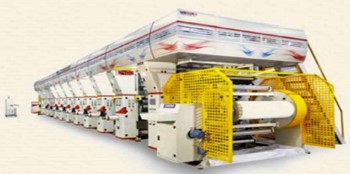



Uflex is India’s largest multinational working in flexible packaging materials. It is a global polymer science company with a turnover of $1.7 billion, and is one of India’s leading providers of holographic solutions used in brand protection, brand enhancement and anti-counterfeiting across a range of industries.
Holography is only one part of what it does. In addition, it works in five other product areas - pharma PVC blister, wide web films, stamping foils, holographic paper and paper board, and track and trace solutions. Its manufacturing base is set up for master origination, flexographic label printing, metallising, coating and embossing. It also provides software solutions for track and trace.
Sustainability is an area of focus for the business, driven by the Chairman and Managing Director, Mr Ashok Chaturvedi. There are five main sustainability challenges when it comes to applied foil products:
PET application challenges – the problem of contamination, cross contamination, polymer degradation and stability issues
The migration of chemical substances from printed layers
Reliable certification and labelling of environmental claims to prove sustainability
Ensuring void declarations are more than just words but actually represent substantive claims
Reliable methods to calculate and verify recycled content in products.
Uflex is working hard on sustainability and has been for many years. At the Davos Recycle Forum in 1995 it was recognised as the first company in the world to recycle mixed plastic waste. More recently, its work has been given extra impetus by the wider move of its consumer goods customers to focus on sustainability. Uflex’s goal is to reach a sustainable circular economy for plastic. To do this it is focusing in three areas.
Uflex has reduced the use of virgin plastic by using more recycled product and trying to use recycled content in packaging. It has re-engineered its processes to reduce total polymer consumption and has established recycling facilities at its manufacturing plants to convert plastic waste into granules.
Uflex has put technology in place to recycle multi-layer packaging and to recover high quality granules. This is achieved despite different layers of polymer having different characteristics and is achieved with its RELAM 250 recycling machine.
Residual plastic waste is collected, shredded and incinerated to generate heat which is used by the production plant in its operations.
Uflex has invested in increasing the deckle size of its equipment. This allows it to achieve higher width utilisation, thereby reducing CO2 by almost 0.0162 per ton per year.

Non-sustainable elements in products are being replaced with sustainable materials.
Wherever possible the gauge of polymer used is being reduced. Up to 90% of virgin material is being replaced with a post- consumer recycled (PCR) film. The PCR film has up to 100% PET content. It is plain, treated, coated, high barrier and heat sealable BOPET film, effectively offering the possibility of a closed-loop recycling solution.
Finally, Uflex is using compressed natural gas for heating.
Uflex has created a biodegradable packaging solution that biodegrades either when commercially managed or in home composting systems.
Aerobic biodegradable enzymatic and a biopolymer infused solution allows bacteria in the soil to degrade the plastic without the use of harsh chemicals. Flexzyme enables microorganisms to latch on to the polymer surface so that a bio-film forms on the surface. The resulting enhanced level of microbial activity makes the surface corrosive, brittle and hydrophilic. This triggers de- polymerisation. Bio-assimilation resultant broken elements act as a source of carbon and energy for bacteria already present in the environment, which promotes and sustains the process until biodegradation is complete.
.jpg)
Uflex won Packaging Europe’s ‘Best Sustainable Packaging Innovation’ sustainability award in 2018 for its biodegradable, waterless flower packaging solution.
Much of this work offers cross-over and potential benefits to a number of different industries. In particular, for the product itself, using part recycled content (film), downgauging film wherever possible and using new generation polymers without compromising on end use requirements. And in the production process, re-engineering the application of foil to reduce total consumption, recycling of waste at plant level and using incineration heat in plant operation (post recycling).